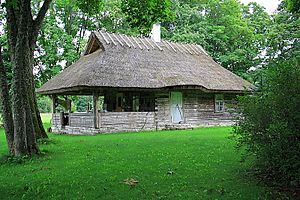August Mälk facts for kids
Quick facts for kids
August Mälk
|
|
|---|---|
| Born | 4 October 1900 |
| Died | 19 December 1987 (aged 87) |
| Occupation | Writer, politician |
| Years active | 1926–1987 |
| Spouse(s) | Pauline "Leini" Triipan |
August Mälk (born October 4, 1900 – died December 19, 1987) was an important Estonian writer and politician. He is well-known for his stories about life by the sea.
Contents
About August Mälk's Life
August Mälk was born on October 4, 1900. His birthplace was the village of Koovi in Lümanda Parish. This area is on the west coast of Saaremaa island. Today, it is part of Estonia. Back then, it was part of the Russian Empire.
From 1923 to 1925, August Mälk studied at the University of Tartu. After his studies, he went back to Saaremaa. He worked there as a teacher. He started his writing career while he was a headmaster. His first novel, Kesaliblik, was published in 1926.
In 1933, Mälk married Pauline Triipan. They had one daughter together.
August Mälk became very famous in 1935. This was after his novel Õitsev Meri (The Flowering Sea) came out. This book showed what life was like in a fishing village. It was the first part of a three-book series. The other books were Taeva Palge All (Under the Face of Heaven) and Hea Sadam (The Good Port).
Besides his 18 novels, Mälk also wrote other things. He wrote plays and short stories. He also wrote two books about his own life. Some of his novels were translated into German and Finnish.
Mälk also got involved in politics in the 1930s. In 1937, he became a member of the National Constituent Assembly. This group helped create Estonia's laws. In 1938, he was chosen for the Chamber of Deputies. This was like a parliament. He served there until 1940. That year, the Soviet Union took over Estonia.
In 1944, August Mälk had to leave Estonia. He went to Sweden to live in exile. This happened during the second Soviet invasion of Estonia. In Stockholm, he became the chairman of the Estonian Writers Union Abroad. He led this group from 1945 until 1982. He passed away in Stockholm in 1987.
In the year 2000, the Estonian Post Office honored Mälk. They made a special stamp to celebrate 100 years since his birth.
August Mälk's Works
Novels
- Kesaliblik (1926)
- Õnnepagulane (1928)
- Hukkumine (1928)
- Läbi öö (1929)
- Kivine pesa (1932)
- Üks neistsinastest (1933)
- Surnud majad (1934)
- Õitsev meri (1935)
- Läänemere isandad (1936)
- Taeva Palgen all (1937)
- Kivid Tules (1939)
- Hea sadam (1942)
- Öised linnud (1945)
- Kodumaata (1947)
- Tea kaevule (two volumes, 1952–1953)
- Päike küla kohal (1957)
- Toomas Tamm (1959)
- Kevadine maa (1963)
Short Stories and Novellas
- Surnu surm (1926)
- Anne-Marie (six short stories, 1927)
- Surnud elu (1929)
- Jutte lindudest (six children stories, 1934)
- Rannajutud (five short stories, 1936)
- Avatud värav. Lugu minevikust (1937)
- Mere tuultes (four short stories, 1938)
- Päike Kadunud. Jutte minevikust (five stories, 1943)
- Jumala tuultes. Viis jutustust (1949)
- Tuli sinu Isesüttiv (seven short stories, 1955)
- Jumalaga, meri! (1967)
- Project Victoria. Kuus lugu (1978)
- Tere, meri! (Collection, posthumously ed. Aarne Vinkel, 1991)
Plays
- Moodne Cain (1930)
- Vaes mehe ututall (Comedy, 1932)
- Neitsid lampidega (Comedy, 1933)
- Isad tee (1934)
- Mees merelt (1935)
- Õitsev meri (dramatization of Andres Särev, 1936)
- Vanakurja vokk (dramatization of Paul Sepp, 1936)
- Õnnega hada (comedy, under the pseudonym Kihulane Juhan, 1937)
- Sikud kaevul (Comedy, 1938)
- Taeva Palgen all (dramatization of Andres Särev, 1938)
Memoirs
- Hommikust keskpäevani. Elupilte ja mälestusi (1972)
- Peale päevapööret. Mõtteid ja mälestusi (1976)


